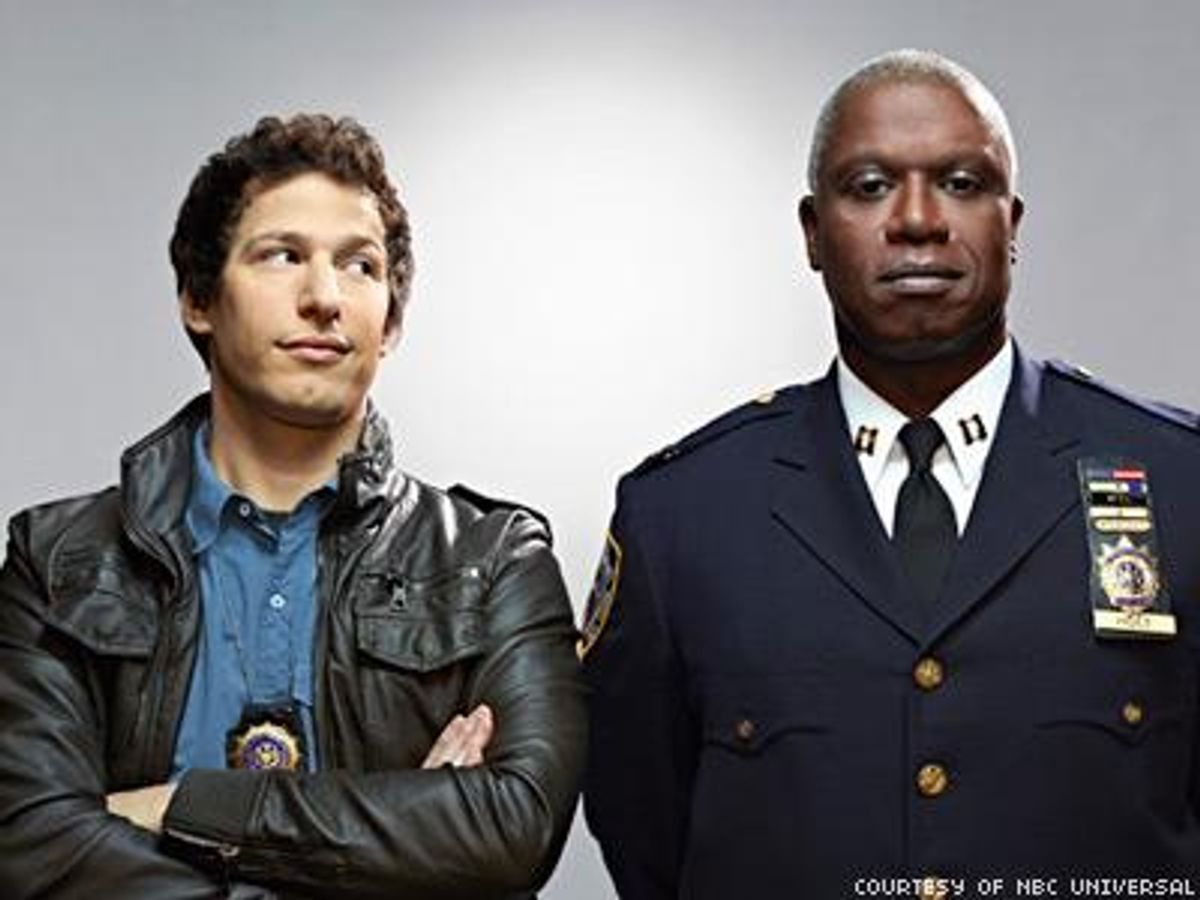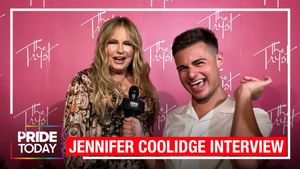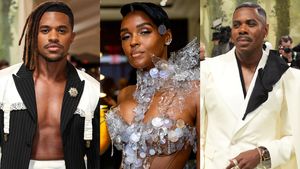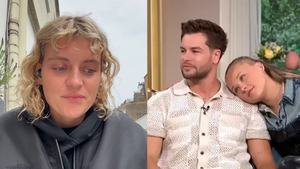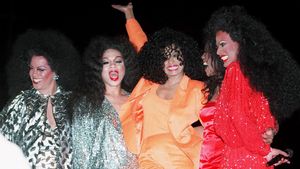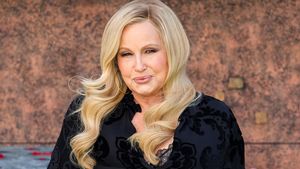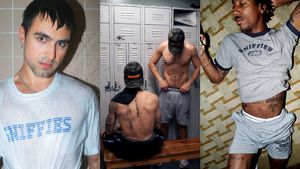As far as prime-time television goes, police precincts haven't historically been a friendly place to be gay or lesbian. If a gay character appears, it's usually as a victim of a crime or, on a rare occasion, as a supporting character. Buddy-cop dramas are generally rife with homophobic humor, rattling off jokes that turn on a central premise that argues none too implicitly that being gay is sick, cowardly, or at the very least, not manly and befitting of a peace officer.
It's against this backdrop that Fox's newest cop comedy, Brooklyn Nine-Nine, enters the fray with all the bravado, attitude, and know-how that one would expect from the New York Police Department. While Andy Samberg's Det. Jake Peralta leads the ensemble cast, his commanding officer is a stoic, no-nonsense black man and 20-year veteran of the force. Captain Ray Holt, portrayed with impeccable gravitas by Andre Braugher, also happens to be gay.
The Golden Globe-winning comedy never shies away from discussing Holt's sexuality, but the series also takes a relatively unprecedented approach by simultaneously not making Holt's sexuality central to the plot -- or more importantly, to the punch line.
"We weren't going to make [Holt's sexuality] the centerpiece of his comedy," explains Emmy-winning creator Dan Goor, whose past credits include Parks and Recreation,Late Night With Conan O'Brien, and The Daily Show. "That's a part of who he is, but ... mining his sexuality for comedy didn't make us comfortable. And at every point, our intention was for him to treat his sexuality the way a straight captain would treat his sexuality."
Goor, who shares the creator credit with fellow Emmy winner Michael Schur (The Office, Parks and Rec, Saturday Night Live) says that while they didn't want to put a rainbow spotlight on Captain Holt, consultation with working NYPD officers confirmed that an openly gay cop in the department would have faced professional roadblocks in the mid '70s and '80s.
The creators had what Goor calls an "un-nuanced" assumption that being an openly gay officer would have derailed Holt's career until the present day, when he finally receives the command post he's been striving for his entire career -- and when the audience gets its first look inside Brooklyn's 99th Precinct, affectionately known by its occupants as the Nine-Nine.
"Our [NYPD consultant] told us that that would definitely have been the case in the early '80s," explains Goor. "And then there would have come a moment where the NYPD would have wanted to showcase him, and put him into a public affairs unit in order to show how LGBT-friendly they were. ... But [Holt] didn't want to be put down, he also didn't want to be showcased -- he just wanted to be a cop."
Indeed, that backstory is introduced as a central plot point in the pilot, where the detectives newly under Holt's command speculate about his sexuality, only to have the captain deliver a guilt-free confirmation that he's gay -- and has a husband -- and notes that he has never tried to hide it, even pointing to a framed news article on the precinct's wall announcing the department's first openly gay commander.
While Nine-Nine's inclusion of a gay man of color who's over 50 (Holt's age is not directly mentioned, but Braugher is currently 51) as a lead on a prime-time comedy would be enough to pique our interest, the show actively combats the homophobia that has become standard fare in buddy-cop comedies.
When Samberg's Detective Peralta gets a chance to spend a few days with an "old-school" crime reporter whom the young detective idolizes, he bends over backwards to impress Jimmy Brogan, the crime scene-hardened and equally hard-drinking journalist. Peralta takes Brogan's jibes at personal acuity in stride, considering the critiques guidance on how to become the kind of legendary cop he always dreamed of being. But when Brogan dismisses Captain Holt's skills by telling Peralta, "You don't have to stick up for that homo," Peralta punches him in the face.
When Holt discovers what Peralta's done, he declares Brogan's scathing article garbage and reminds Peralta that "Jimmy Brogan wouldn't know a legit cop if he punched him in the face."

The men and women of the Nine-Nine (from left): Melissa Fumero as Det. Amy Santiago, Terry Crews as Sgt. Terry Jeffords, Andy Samberg as Det. Jake Peralta, Andre Braugher as Det. Ray Holt, Stephanie Beatriz as Det. Rosa Diaz, Joe Lo Truglio as Det. Charles Boyle, Chelsea Peretti as Gina Linetti
This unabashed intolerance of homophobia, combined with the show's insistence on treating its gay character like all the others, while still acknowledging the character's difference without mocking it, truly sets Nine-Nine apart from its genre and even from its prime-time contemporaries. While other network shows like Grey's Anatomy, Scandal, and Revenge readily incorporate gay and lesbian characters into recurring storylines, Captain Holt's full character development and episodic ever-presence makes the portrayal groundbreaking.
"The time will come one day when nobody cares about the color of a character, or their sexuality, or their origin," says Braugher confidently. "But we're not there yet -- people still care."
While Braugher, who is a straight, married father of three, says he's looking forward to the day -- "five, 10, 15 years from now, when nobody cares" -- he also knows that Nine-Nine's comedy is unique.
"This happens to be groundbreaking comedy, believe it or not," he says. "And I'm not sure anybody intended it to be groundbreaking comedy -- it's respectful and humane, and that happens to be surprising."
Braugher, who has played several gay characters in his 25-year career in film and television, admits that his son was less than thrilled with the idea of his dad playing a gay police captain.
"I had to explain that, well, I'm not going to be playing a gay police captain, I'm going to be playing a police captain who's gay," recounts Braugher. "And he said, 'Well, I don't get the distinction.' So I instinctively said ... it's a respectful portrayal. I assured him that there's something that I would give Holt to add to that distinction -- that's just one aspect of a very complex character."
As for Braugher, he wasn't concerned about taking on the role of a gay leading man.
"I never had any doubts that this was going to be something wonderful and something groundbreaking from the very first moment we did it," he says. "It's a really inspired comedy."
Ultimately, Braugher says he was attracted to the challenge of the role -- though that challenge was less about the character's sexuality and more about the dramatic actor's foray into comedy.
"I'm just grateful, myself, that I get the chance to grow," says Braugher. "Because this is exactly the point in anyone's career where they get pegged, playing the police chief."
Braugher particularly enjoys what he calls the "round-robin" style of character engagement, where each member of the ensemble cast has notable screen time and engages with most of the other characters.
"I get to act with everybody on this show, and I really enjoy soaking up the comedic talent," says Braugher.
That comedic chemistry among the entire cast shines through, and results in an effortlessly diverse cast that feels realistically reflective of modern-day Brooklyn and the NYPD.
While it's arguably one of the most diverse shows on prime time right now, Nine-Nine approaches that diversity with a similar nonchalance as it does its commander's sexual orientation. Of the eight characters who appear in all of the show's 20 episodes thus far, four are people of color, and three happen to be women. Not only is the Nine-Nine led by two established black men -- Captain Holt and Sgt. Terry Jeffords, a bodybuilder and devoted father played by Terry Crews -- the show's two leading females are both Latina and represent comedic foils to each other. Stephanie Beatriz's Det. Rosa Diaz is hard as nails, unshakeable, and has a penchant for playing with heavy-duty firearms, while Melissa Fumero's Det. Amy Santiago is the professional incarnatation of the teacher's pet, desperately seeking Captain Holt's mentorship and approval by neurotically excelling at her job.
"We finally have a New York that looks like New York," says Braugher, noting that the show's creators "held a mirror up to life, and decided to portray this [precinct] with appropriate characters, of appropriate gender, ethnicity, and orientation. ... We've got an incredible amount of diversity -- and that's a brave thing to do."
For his part, Goor says the cast's diversity was a consideration, but ultimately the roles went to the best actors, regardless of their skin color.
"We cast the roles in a color-blind manner," says Goor. "And really, the best people won. So all of the roles at the casting stage had very racially neutral first names and surnames -- they were all sort of Jane Does -- and that allowed us to cast whoever was funniest into the roles to change the names to fit the people, as opposed to finding people to fit the names."
Ultimately, Brooklyn Nine-Nine manages a delicate balance between the physical, slapstick comedy viewers have come to expect from TV depictions of police stations, while simultaneously refusing to engage in mean-spirited attacks that center on its characters' differences. And that's intentional on the part of the creators and writers -- who include out writer Gabe Leidman (Inside Amy Schumer, Fodder).
"What we're trying to do is to tell stories that involve a diverse group of people who have unique perspectives on life, and to tell those stories in a comedic way, without resorting to comedy about their differences," explains cocreator Goor. "Which is not to say that there's no conflict, it's to say that the conflict doesn't arise from stereotypical views of their background."
Since Brooklyn Nine-Nine was just renewed for a second season on Fox, viewers can look forward to seeing much more of this "collection of lovable goofballs," as Braugher calls the cast, along with more comedy, heart, and unapologetic inclusion next Fall.
Brooklyn Nine-Nineairs Tuesdays at 9:30 p.m. Eastern/Pacific on Fox. The first 20 episodes of the series are also available on Hulu Plus.
